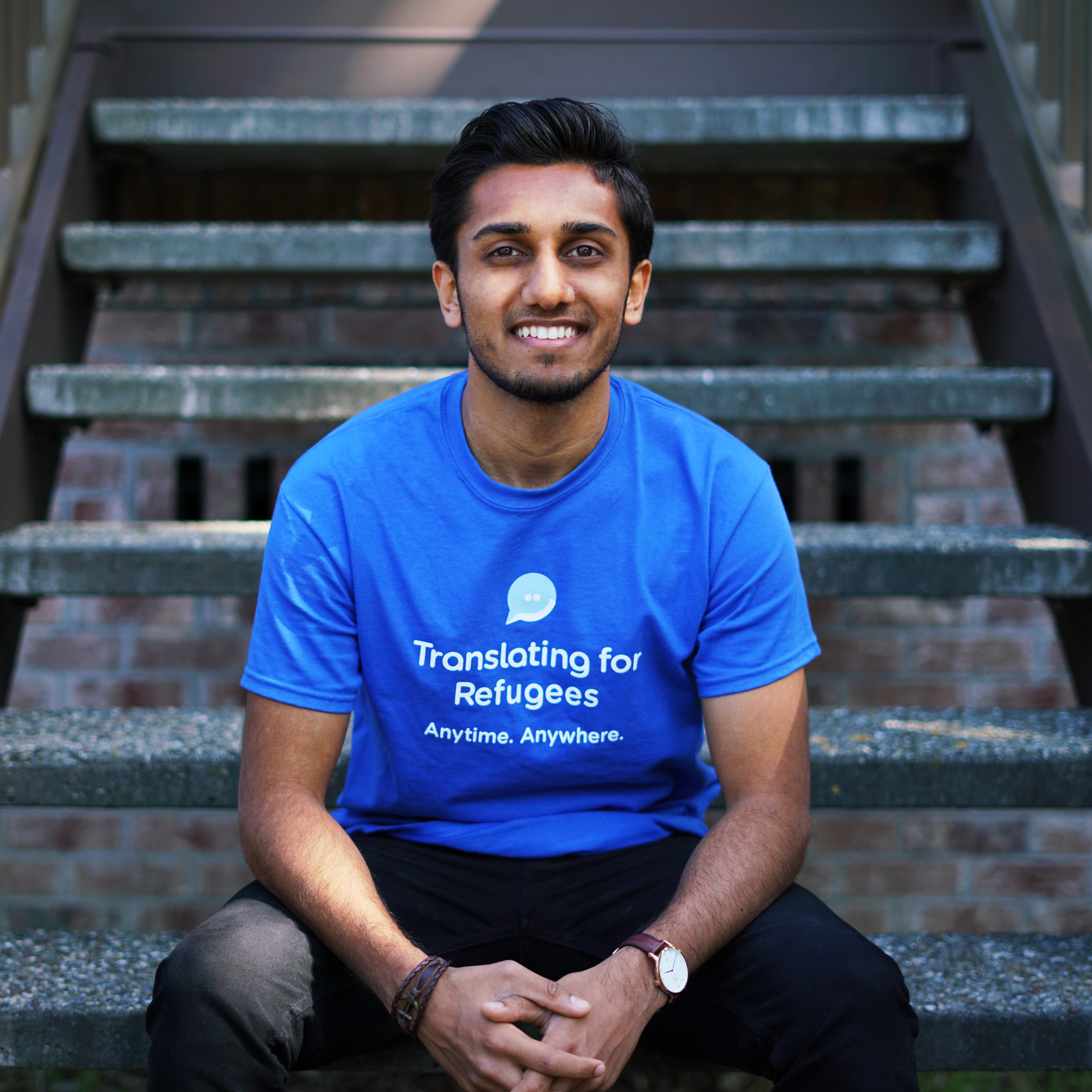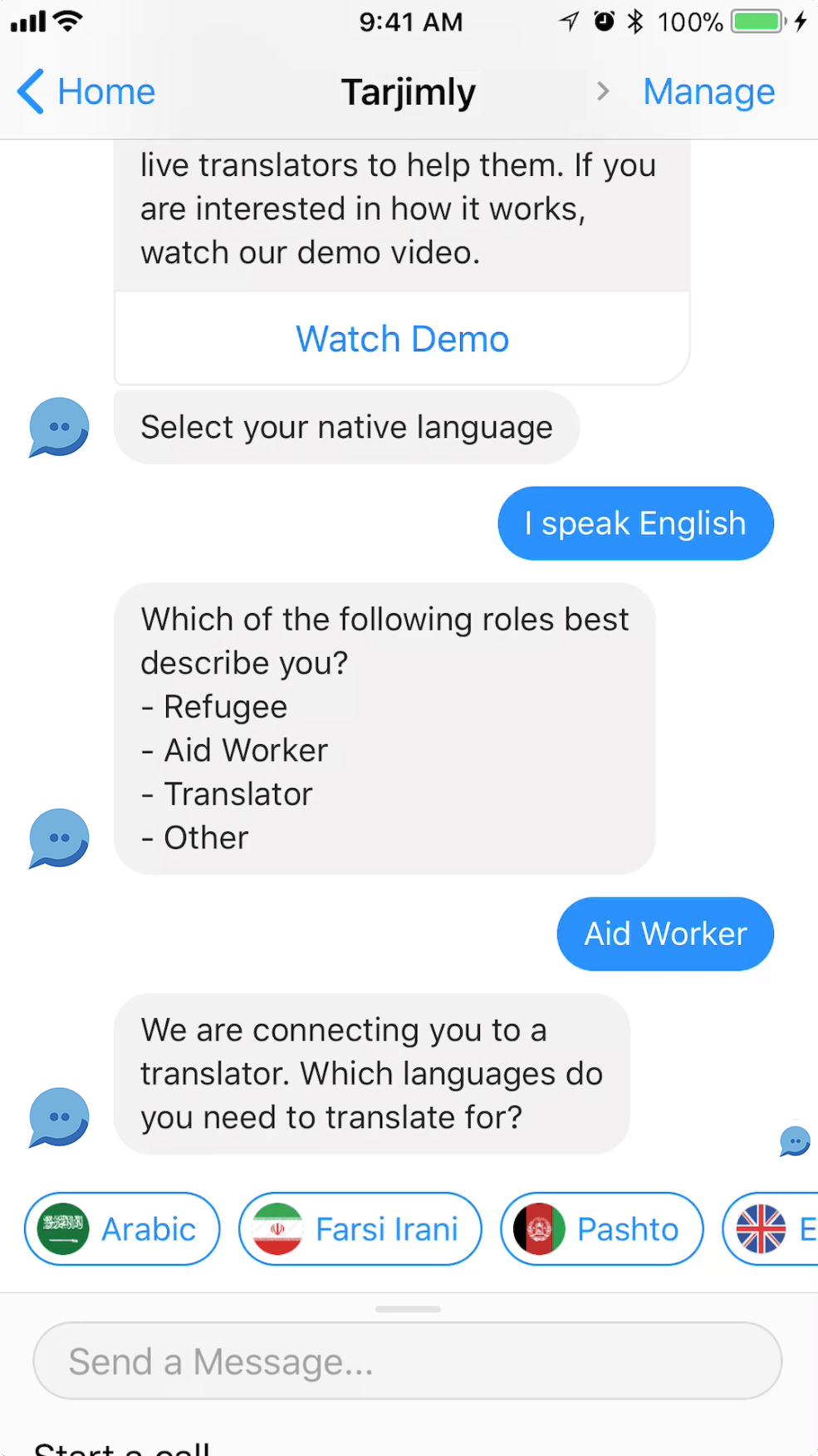Whenever a disaster or crisis strikes some part of the world, the first thought that often comes to a person’s mind is “how can I provide things like donations, food, or supplies to the survivors?” In some cases, that person might even be motivated to travel to the disaster site themselves to provide assistance. But while all of these thoughts are noble and good intentioned, they ignore a very crucial question. How well can support be provided if the people on the ground can’t even speak the local language? While the issue of translation has been recognized by NGOs and aid agencies for quite some time, the resources available to get around it have traditionally been either expensive or hard to acquire. That is, until Tarjimly came along.
Born in the wake of the Syrian refugee crisis, Tarjimly uses Facebook Messenger software to connect service providers with a network of bilingual volunteer translators all across the world. Tarjimly connects translators to end-users reliably and fast, as can also share documents and records via chat. I spoke with Tarjimly co-founder Atif Javed to talk more about Tarjimly’s roots, its mechanics, and its wide-ranging future ambitions.
How did Tarjimly get started?
Aziz Javed: Aziz and I were at MIT together as students, and we were there at the height of the Syrian refugee crisis. A bunch of our friends actually went to Europe to volunteer in the refugee camps, and we felt bad because we were unable to do that since we were students. We asked our friends what was something we could do to help as engineers, and a lot of them said that language was one of the biggest problems that refugees face, whether it’s hundreds and hundreds of refugees coming off of boats or it’s refugees that are resettling in camps or new countries like the US. This language barrier was one of the biggest problems the refugees faced, and most of the time people didn’t think about this because they were more focused on crisis scenario things like food or clothing. They weren’t thinking about how every single one of those services, every single one of those things a refugee faces is actually made harder because of the language barrier.
So Aziz and I actually volunteered as remote interpreters, and we started saying to ourselves “we’re doing this from overseas, there’s no reason why any of our friends couldn’t do this as well.” So we built this platform on Facebook Messenger that allows any bilingual to spend time as a translator for refugees. We initially launched around the time of the travel ban, and we signed up thousands of translators in a couple of days. We had a bunch of people who were saying “I want to be able to do something to help these immigrants and refugees, and to show my solidarity with these people.” Our circle of friends are mostly Arabic-speaking, Farsi-speaking, Urdu-speaking people, so we were easily able to get the right population of translators onto our platform.
I remember the first scenario that played out when we first launched. There was a volunteer at a women’s center in Greece, a women’s trauma counselor. She found out about Tarjimly and was just blown away by the fact that she could finally work with these Afghan and Syrian women in the camp. She could talk to them, she could get a translator on the phone. I remember that was one of our first sessions, and since then it’s driven us so hard. The women that were coming to the center were dealing with sexual harassment and abuse and didn’t want to go back to the camps where they wouldn’t have food or be able to shower, and were dealing with depression and suicide. It was this moment of realization that our service could actually have a huge impact on the life of a refugee because it breaks down the barrier between all of these service providers and the refugee population.
You think about these hundreds and hundreds of people that are trying to have some sort of impact and help these refugees, but they literally can’t even talk to this population. We realized that the core users for us are actually the NGOs, service providers, and aid workers. Over the last six months we’ve had this ridiculous influx of NGOs. We’ve worked with a bunch of them trying to partner with many of them, and we now have a thousand aid workers on our platform today after six months.

In the Photo: Tarjimly co-founder Atif Javed. Photo Credit: Tarjimly.
How does Tarjimly work, what are the mechanics of the tool?
AJ: The really special thing about what we created is that it’s a real-time platform. If you’re an NGO, you can get your document submitted to somebody who can translate for you in a day or two. What we’ve done is provide the ability on Facebook Messenger to allow real-time translation. All you have to do as bilingual is go to our Messenger application, search Tarjimly, and sign up as a translator after giving information like skill level and experience. We take this data and use it to create a profile of you such that when NGOs or refugees ping the application for a translator, they can go down to the specifics of “I need a female translator who can do legal documents and speaks Syrian Arabic, and I need it in this time.” We can do all of that specific routing in 60 seconds, and we ping our pool of translators.
The person who accepts the request gets put into a live chat session so that they can do translations, through text, pictures, or documents. The super cool thing is that call sessions are anonymous. After learning a lot from transcribing services in London – UK, the sensitive information were protected and if there’s sensitive information and a refugee wants to protect their name or their number, we actually use Tarjimly phone numbers and block last names. We only provide the first name so you know whom you’re talking to. It’s a fully anonymous system that you can use for your translation needs, and then when you’re done you rate the translator so that we can build this profile of really good translators at the top of the funnel. So there’s a gamification element as well, because these translators are racing to accept requests.
It’s a very interesting model of translation that’s really different from anything else. The closest thing I can think of is these huge enterprise language solutions that you call and they say you get a translator in two minutes or five minutes. But that translator is most likely not someone with any specifications like dialect or expertise. There’s also this whole reverse incentive structure where if you’re paid, you’re probably going to overestimate how good you are as a translator because you want to get paid opportunities. But if you’re not paid, and if you’re a volunteer, it’s actually the exact opposite. The entire incentive model is switched. We actually have people who message us and say “I’m not sure if good enough” or “maybe I shouldn’t sign up,” and we say “we handle all the matching and scoring and figuring out who’s the best translator.”
We’re actually using machine-learning models to figure a lot of this out. We have two Stanford PhD’s on our team who volunteer their time to actually work on building these machine-learning models. My co-founder Aziz focused on machine learning at MIT too. That structure is what makes Tarjimly very powerful, and that’s why we can get you a schedule interpreter so quickly.
It’s interesting to see the level of thought put into the Tarjimly platform.
AJ: Aziz and I are both product guys from Silicon Valley. He was at Palantir, I was at Oracle, so we were really, really solid when it comes to product development. This is why we were backed by Y-Combinator in January, and this is why they saw a lot of potential in this idea that can scale and is super low-cost, which is something that really doesn’t exist in the humanitarian space. In the humanitarian space you don’t usually get that persona of people working on this, but we’ve been able to do that because we care a lot about this problem given our backgrounds and because we’ve come across this unique insight.
We spent months and months interviewing people. We’ve done hundreds of interviews with refugees and NGOs to understand their problems to a very fine level of detail, and that’s something that real product engineers and product developers do really well. You can see that translate well into Silicon Valley and why so many Silicon Valley companies are successful. We’re taking that into the humanitarian space, which is usually untouched by Silicon Valley people.

In the Photo: A Tarjimly app screenshot. Photo Credit: Tarjimly.
What do you see as the future of Tarjimly?
AJ: There are specific things we want to achieve within the next 6-12 months. Those center around being able to build out a platform independent from Facebook Messenger. The Messenger platform has its limitations. It’s amazing to get something off the ground, but it does have limitations for building out future tools. We want to build out our own separate mobile app, and we’re going to be doing that for the next three months.
I also want to see a really strong showing of corporate sponsorship from different companies in Silicon Valley, whether that’s Facebook, Twilio, or Airbnb that does work with refugees. I want to be able to court a lot of the larger Silicon Valley companies to be at the very least adopting a CSR approach, or getting employees to do some volunteering. There’s no reason that all of Facebook’s employees shouldn’t be signed up for our service if they’re bilingual, or all of Google’s employees. I would like to see that as where Tarjimly goes, where it’s part of the movement to bridge the divide between Silicon Valley and the rest of the world that really needs support and really needs help.
Going forward, building the mobile app will be part of that, but I also want to start getting us out of the concept of just translation. I know for a fact that 85-90% of refugees in Europe are in need of mental health support or psychological support. The vast majority of the same users that we have are also dying to learn a language or learn how to code so that they can rebuild their lives and integrate into new countries. These are all problems that can be solved because we’re starting to prove that with translation. Translation is very easy because it’s an easy thing to do over chat or phone, and as we get into our own platform I’d like Tarjimly to be the bridge between the world of people that want to be able to help refugees and people in need, and those people in Europe or around the world.
An example of this is crisis management. We have thousands and thousands of translators who can help tomorrow if there’s a crisis in Puerto Rico and they need Spanish-speakers. Our community of volunteers and translators can be a part of that deployment, and help those organizations on the ground remotely. For me, it’s this idea of just making humanitarian aid remote and super efficient. Those two things are where we want Tarjimly to be in the future.














